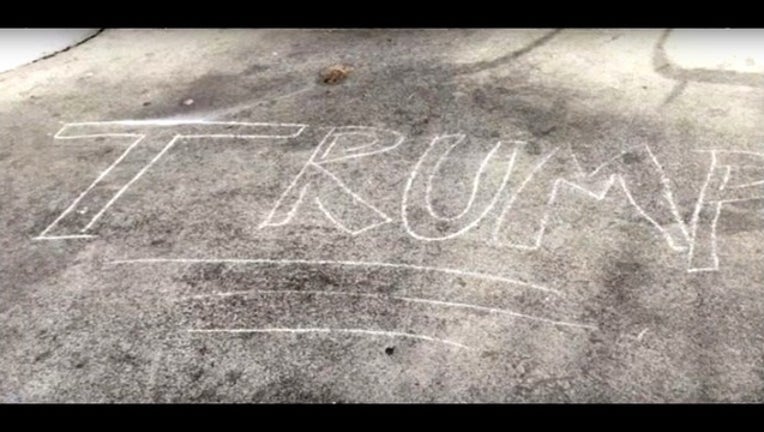Students scared by 'Trump 2016' chalk signs

Students at Emory University were offended by Trump chalk drawings on campus.
ATLANTA (AP) - A flurry of chalk scrawls supporting Donald Trump on the Emory University campus sparked a demonstration by students who demanded and were granted a meeting with the president, saying the messages made them feel concerned and frightened. At least one of them said he got death threats after the protest.
The students viewed the messages as intimidation, and they voiced "genuine concern and pain" as a result, Emory President Jim Wagner wrote Tuesday, one day after meeting with 40 to 50 student demonstrators.
The Atlanta university on Wednesday provided The Associated Press with a copy of Wagner's letter, in which he said students confronted by Trump's name in chalk "heard a message about values regarding diversity and respect that clash with Emory's own."
Students at Monday's protest chanted, "You are not listening! Come speak to us, we are in pain!" shortly before Wagner agreed to meet with them, Emory's student newspaper, The Wheel, reported.
Slogans such as "Trump 2016" were written in chalk on campus sidewalks and some buildings sometime during the weekend. At least one of the chalk messages stated "Build a wall," said one of the students at the protest, Jonathan Peraza, 19, who said he is of Latino heritage and went to high school in suburban Atlanta.
"That is a direct reference to brown people on campus," Peraza told The Associated Press Wednesday, adding that "we feel unsafe on our campus."
"It was an intentional way to rile students up and intimidate those of us who feel we are in danger with this presidential candidate," Peraza said. "We do feel that our lives are in danger with his campaign and the violence that he's been inciting."
Peraza said that since the demonstration, he's received death threats on social media, including a picture of a gravestone with his name on it. He's forwarded the threats to Emory administrators, he said.
Peraza said he was not the leader the protest, but was one of many demonstrators.
"We're getting targets put on our backs because we're speaking out for the things that we need," he said. "I'm literally watching my back all over campus."
Another student protester, Lolade Oshin, 20, said no one is trying to take away anyone's First Amendment right to free speech.
"Nobody ever told anybody that they can't vote for Donald Trump," Oshin said.
She and other students are frustrated, she said, at what they perceive as rhetoric from university officials and not enough concrete actions to promote tolerance.
"If there were pro-Hitler things around the campus or swastikas, Emory would have taken a stance on it," she said. In October 2014, Emory University officials said the FBI had joined an investigation into swastikas that were painted on the exterior of a historically Jewish fraternity house.
Oshin said she's meeting Friday with Emory administrators, who have been working for months on several policy changes, which Wagner outlined in his letter to students.
The changes include refinements to the school's "bias incident reporting and response procedure," Wagner wrote. Emory is also taking steps to have regular opportunities for "difficult dialogues," he wrote.

